
When deciding on your business phone system, you simply can’t go with what’s new in the market. You need to choose a solution that supports your team’s workflow, grows as your business grows, and makes the communication process as simple as possible. As you dig into options, you learn that there are two big players: The traditional on-premise phone system and the modern hosted cloud-based phone system. So what’s the real difference when it comes to hosted vs on-premise phone systems?
This post will break it down in simple language with some interesting and practical examples. We’ll also dive into the pros and cons of each type of phone system to help you understand which one is right for your business.
What is an On-Premise Phone System?
On-premise phone systems are the phone systems that are housed within a company’s own facility or physical location. These are also termed as ‘in-house’ or ‘locally’ installed phone systems, typically residing in a server room or communications closet.
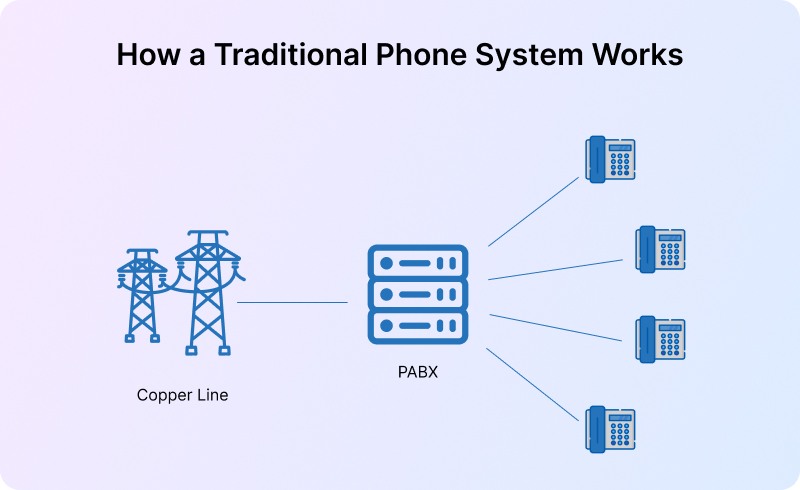
This means that all the equipment of the phone system, including servers, switches, and PBX boxes, resides on-site and is managed and maintained by the business itself. For example, let’s say you are a small IT company having an office in a single building. You have invested in a PBX system that resides within the office, and you have a 2-person IT team that takes care of the system. Here, you or the company has complete control over the system, which also means that you are solely responsible for all the maintenance, upgrades, and troubleshooting. If you’re unsure about the technical distinctions between different types of private branch exchanges, it’s helpful to understand the comparison between PBX vs PABX, as this can guide your decision based on automation level, hardware requirements, and scalability.
What is a Hosted Cloud-Based Phone System?
Hosted phone systems are in total contrast to on-premise systems. Instead of managing the installation of the hardware equipment and managing it all within the office premises, the business or company simply subscribes to a phone service hosted over the internet. So, who installs and manages the phone system’s physical hardware?
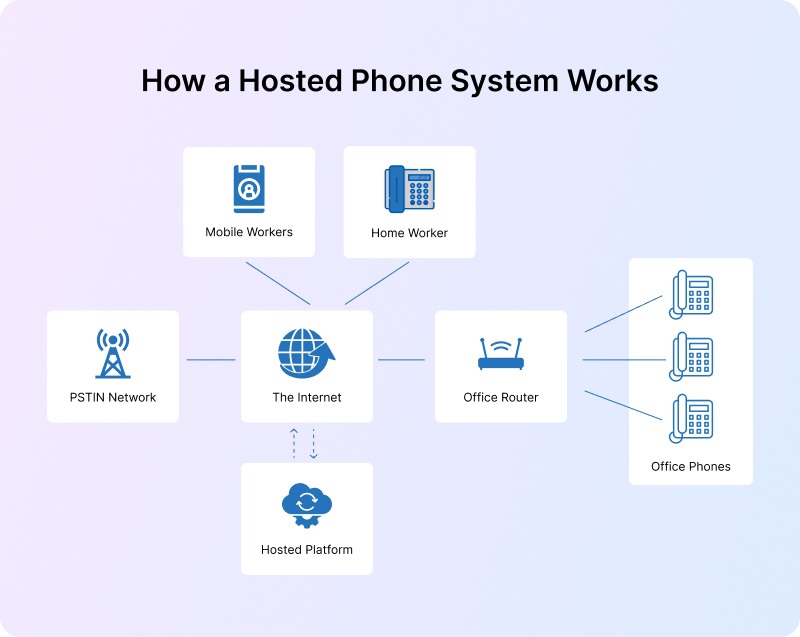
Here’s how these systems work behind the scenes: The physical hardware, including servers, switches, PBX, and networking equipment, is owned, installed, and managed by the service provider. Usually, they set up the equipment in secure remote data centers spread across multiple geographical locations. This is done to ensure redundancy and maximum service uptime. Till here, the entire process is more like that of a traditional on-premise system; however, these PBX software systems are virtualized, i.e., they are accessible via the internet.
As a customer, you connect to the service using your existing or new internet connection and enjoy calls and other phone services using VoIP. You may use the hosted cloud phone service using the following:
- SIP-enabled desk phones
- Softphones (apps on your laptop or mobile)
- Web-based dashboards
Here’s a practical example of how hosted cloud telephony systems work:
Suppose an employee from your office dials a phone number from their laptop. The call request is sent to the service provider’s cloud server, which handles call routing and directs it to the appropriate destination. The server itself bridges the call without needing any on-site OBX.
In short, service providers hosting cloud phone systems are responsible for:
- Monitoring the performance of the server and service uptime
- Ensure proper implementation and running of security protocols and firewalls
- Timely performing the software updates and security patches
- Backing up the call logs and configurations
- Scaling server resources as needed
One of the biggest perks of switching to a cloud-based contact center? Businesses using cloud-based contact centers have reported a 15% reduction in IT personnel costs. And that’s not all, switching to cloud also offers improvement in terms of security, as evident from the below statistic.
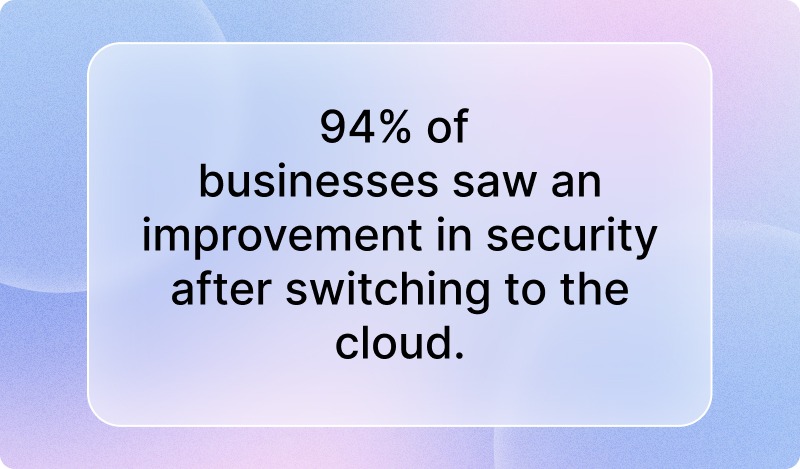
With this, we conclude that businesses or companies get the benefit of enjoying a full-featured phone system service without doing the heavy lifting at all. We’ll discuss more about the benefits later in this post.
On-Premise Phone System Vs Cloud Phone System: Pros and Cons
Choosing between hosted vs on-premise phone systems can make or break your business communication. That’s why it is important to learn the pros and cons of each and make the right decision. Let’s break them down:
Pros of On-Premise Phone Systems
- You Get Full Control Over Infrastructure

Since you or the business physically owns and operates all the hardware, you are the boss. It is you who decides the configuration, maintenance, and upgradation of the phone system. Many companies that follow tight security guidelines or compliance regulations can benefit from on-premise setups.
- You Only Need to Invest Once
Except for the maintenance and occasional upgrades, you only need to pay once for the hardware. Though the initial cost is high, it saves you from recurring service costs. Well-established firms that can easily afford a high upfront investment can opt for hosted phone systems.
- Your System is More Reliable
Because on-premise phone systems are installed and managed locally, the calls stay inside your company’s network, which is why they work even during internet outages.
Cons of On-Premise Phone Systems
- You Have to Bear a Huge Upfront Cost
Setting up a phone system within your business facility means you’ll need to purchase servers, PBX units, handsets, cabling, and also hire IT staff for its management. This demands a huge investment, and if you ask how much? It may run into thousands or tens of thousands.
- There’s a Maintenance Burden As Well
Since you are solely responsible for the system’s services, any time something slows down or crashes, it is you who needs to stay on top of things.
- You Get Only Limited Flexibility
Another downside of on-site phone systems is that you can scale up only up to a certain level because you’ll need to buy more hardware. Even moving your office or switching to remote work is not easy.
Pros of Hosted Phone Systems

- You Only Pay a Monthly Subscription Cost
Cloud phone systems offer the biggest benefit to companies with low upfront costs. It is because you don’t need to invest in hardware equipment and the physical space, as the provider handles the infrastructure. Studies show that cloud solutions can slash communication startup costs by as much as 90%. That means you can invest more in marketing, hiring, or product development.
- You Can Easily Scale Up and Down
In contrast to on-site systems, hosted phone services allow you to add or remove users in just a few clicks. This means you get the ability to grow and shrink your phone system effortlessly as your business changes. Companies can easily adapt to seasonal changes or demands right from their phone systems.
- Supports Remote Work
It is needless to mention that the hybrid and remote work culture is a huge trend. Cloud-based phone systems enable employees and teams to work from the location of their choice – their home, from the airport, sitting in a café, or even at the beach. The only mandate is the availability of a stable internet connection. A joint study by Harvard and Stanford found that hybrid workplaces save companies up to $11,000 annually per employee, thanks to reduced real estate, utilities, and support costs. Hosted phone systems align perfectly with that trend, enabling mobility while cutting overhead.
- No System Workload Upon You
Whether it is about installing updates, patches, or new features on the phone system, it is the service provider’s responsibility to keep things up-to-date. So there’s no extra work for you.
Cons of Cloud Phone Systems
- Dependency on the Internet
In the case of hosted cloud telephony, the working of the system is entirely dependent upon the quality of the internet connection. This means if your internet goes down, then your phone system also goes down. However, backup options like mobile apps or failover routing may be helpful in such scenarios.
- Long-Term Financial Commitment
To use a cloud phone system service, you’ll need to pay a monthly fee, which may add up over time. However, this recurring cost is still less than the up-front costs of on-premise phone systems.
- Lesser Control over the Infrastructure
Your cloud phone system is managed by your service provider, which means you rely on your provider to manage the service. If their server has issues or the data center has an outage, then it affects your phone service, even though your internet is working fine.
From all the pros and cons we just learned, it is clear that both on-premise and hosted phone systems can be powerful. It all depends on how your business operates and what you need from your communication tools. The next section provides a detailed examination of this topic.
Hosted PBX vs Onsite PBX: Which Solution is Right for Your Business?
Businesses can’t rely on fancy tools – they need systems that are operationally and strategically sound. So if you are choosing between on-premise and hosted phone systems, keep in mind the following points:
When to Choose On-Premise Phone Systems?
Your Business Operates From a Fixed Location
This one is quite obvious because on-premise systems need hardware equipment installation that cannot be moved easily. So, if you are having a stable, centralized office, then opting for on-premise phone systems makes sense.
You Need Complete Control Over Security and Hardware
Several industries mandate businesses to maintain strict control over data due to legal or compliance issues. By having an on-premise phone system, you can ensure that all your data stays within your business’s physical premises.
For example, a healthcare firm that handles sensitive patient data opts for on-premise systems to meet regulations like GDPR, HIPAA, FINRA, etc. By doing so, the firm ensures that call recordings and logs don’t go through third-party servers.
You Have A Proficient IT Team
On-premise phone systems require skilled and experienced IT personnel who can maintain servers, handle downtime, and upgrade software. So if you have access to such resources, then on-premise systems are a great choice for you.
So if you meet any or most of these points, then you can really think of going with the on-site phone systems.
When to Choose Cloud Phone Systems?
Now, let’s move ahead and discuss the considerations to be made if you are thinking of opting for cloud phone systems.
Your Business follows a Hybrid or Remote Work Culture
Like most businesses, if you are also following the flexible work culture, then a cloud phone system can be a great support. This is because you have teams that are spread across multiple cities or locations, and a cloud phone system allows them to use mobile apps or softphones from their internet-enabled devices. They can easily stay connected via video meetings, voice calls, and instant messages, just from anywhere.
You Want to Scale Fast Without Making a Heavy Investment
Hosted phone systems follow a pay-as-you-go model. This means there’s no need to buy hardware or lease expensive equipment. So when it is about adding new users, you can do that quickly and without spending much.
For example, an e-commerce company hires 20 new customer support agents. With a cloud phone system, the company doesn’t need to buy expensive hardware; rather, they get everyone on softphones in under a day.
You Prefer Third-Party Management
Cloud phone systems provide you with the benefit of leaving everything from maintenance and bug fixes to rolling out new features to your service provider. So if you want fewer headaches, then choose the cloud.
When comparing hosted vs on-premise phone systems, don’t ask “Which phone system has the most features?” Rather, ask “Which one fits better into our workflow?”
Practical Tips to Choose the Right Provider

Now that you have decided on the technology you want for your business communication, choosing the right provider, whether for a hosted or on-premise setup, is equally important. Remember that the wrong provider can turn even the best technology into a daily hassle for your business.
We bring together some of the most practical tips to help you make the smartest choice.
1. Don’t Compromise On Security & Compliance
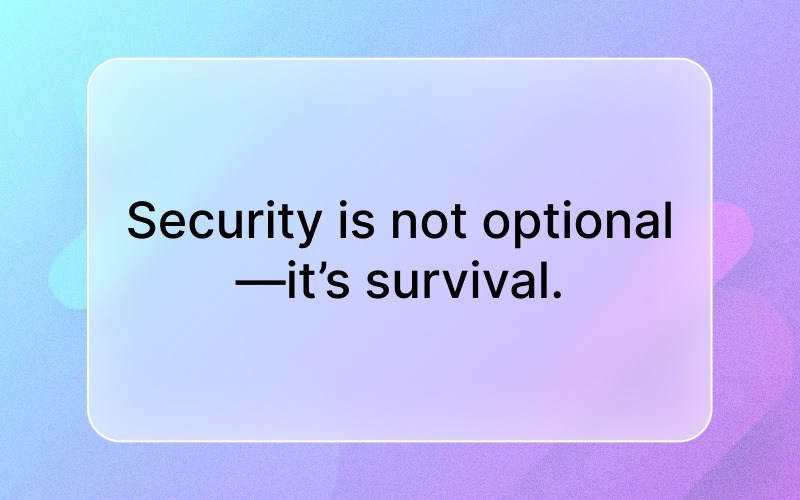
Take this one as a non-negotiable. If you are a business that handles sensitive data such as confidential client communications, then make sure your provider meets the required security standards. You may look for industry certifications such as GDPR if you are operating in the EU region, HIPAA if you are in healthcare in the US, ISO 27001, and others. Make sure your provider guarantees encrypted call data, secure storage, and access controls. Also, don’t forget about audit logs for compliance tracking.
2. Don’t Go With One Size Fits All
Your business is unique. This means that you’ll need a phone system that can blend with your business workflow rather than forcing you to change the way you work, right? Therefore, look for a provider who offers customization options in terms of IVR menus, call routing rules, features, etc. Moreover, a white-label phone system option would help you set the system just the way you want it.
3. Ensure Global Reach
This is especially important in case you are choosing a cloud phone system service. If you are a business that operates internationally, then look for a provider that supports local phone numbers in multiple countries, global call routing, and multilingual IVR.
4. Consider Support Services as Your Lifeline
Even if your phone service offers the best features, don’t forget that what makes it great is the quality of support it offers. Evaluate several aspects of customer support service, including:
- Does the provider offer round-the-clock (24/7) support?
- Is it just ticket-based with 24-48 hour replies?
- Or is there live human support?
- Do they offer a dedicated account manager?
- Is training and onboarding support available?
5. Think About Scaling 5 Years Ahead
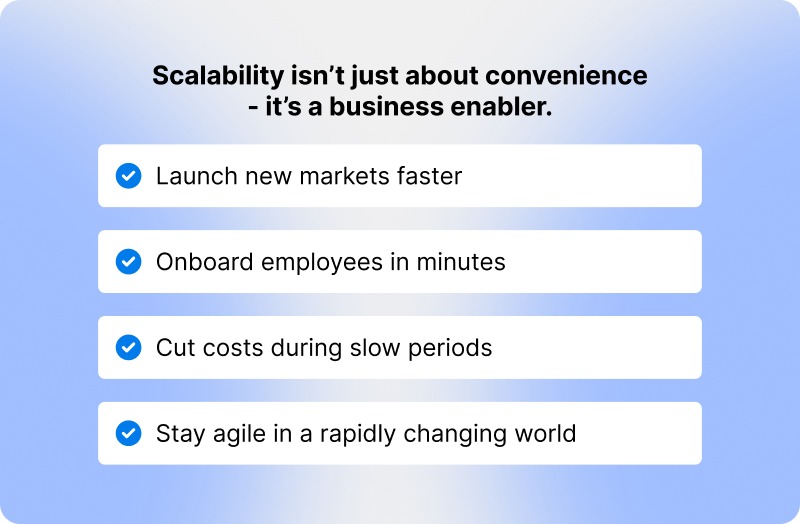
Don’t buy your business phone system just for now. Rather, think about where you will be 5 or 7 years down the line. Maybe you will add more branches, launch your service overseas, or grow a remote workforce. A provider that lets you scale easily and without breaking the bank should be your choice.
Make the Right Choice with REVE Cloud Telephony
Whether you prefer the flexibility of the cloud or the control of an on-premise setup, REVE Telephony offers the best of both worlds. Powered with advanced AI and enterprise-grade infrastructure, REVE’s telephony system supports on-premise deployment or cloud-based access, depending on what you need.
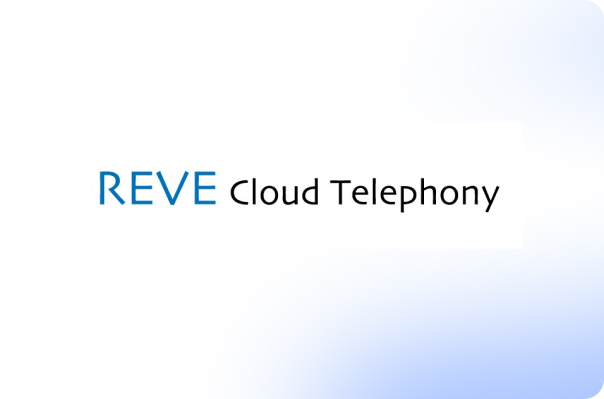
Our Cloud PABX and Contact Center solution is tailored for medium to large enterprises and call centers. With REVE, you get a fully customizable, carrier-grade telephony system that stands out in several ways, including:
- Dual Deployment Options
- White-Label Ready
- AI-Powered Communication
- Omnichannel Engagement
- Mobility & Multi-Device Support
- Centralized Management
- Enterprise-Grade Security & Reliability
Ready to Upgrade Your Phone System?
Book a free demo to discover how REVE meets the demands of your dynamic business environment and powers your communication.
Frequently Asked Questions
Which phone system is more cost-effective: Hosted vs On-Premise Phone System?
In case of hosted phone systems, there’s no big upfront investment in hardware and dedicated IT staff. You only pay a monthly subscription fee, and the provider manages everything. So these systems are more cost-effective than on-premise systems that require a huge initial investment.
Are there any hidden costs in hosted PBX solutions?
A reliable hosted phone provider will keep the pricing transparent. However, it is always a wise move to look for additional fees for extra features, international call rates, charges for exceeding usage limits, and custom integrations
Are hosted phone systems secure?
Yes, hosted phone systems are quite secure if you are opting for a reliable service provider. A reputable service offers end-to-end encryption, firewall protection, data redundancy and backup, and compliance with standard regulations.
What happens if my internet goes down with a hosted phone system?
If your internet goes down, you may temporarily experience downtime with your phone system. Having a redundant internet connection or mobile backup is a smart strategy.
Which system is easier to scale as my business grows?
Hosted phone systems are an absolute choice when it comes to scaling up or down.
Can I move from on-premise to hosted later?
Yes, several companies that started with on-premise systems made the transition to hosted phone systems. A good hosted phone service provider can assist with this transition, making the process smooth and disruption-free.
Can I have both on-premise and hosted systems at the same time (hybrid)?
Yes, you can. This hybrid setup is perfect for:
- Businesses with a central office and remote teams
- Companies transitioning from legacy systems to the cloud
- Organizations needing both control and flexibility






















